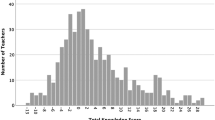Abstract
Dyslexia is a theme that commits teachers to define strategies and methodologies suitable for guaranteeing educational success even for dyslexic students. In this sense, the development of teaching technologies has supported teachers on the one hand and (dyslexic) students on the other hand: this does not mean that technology is the solution to teaching/learning problems. The purpose of this article is to build a table of process indicators that can be useful to teachers as a guide for designing the learning process. Process in which learning experiences, supported by new technologies, can be organized in different ways, in order to meet the needs of the entire class group, intended as a group of heterogeneous students as far as learning (dyslexic and not dyslexic students), but also personal life styles are concerned. Schools will increasingly face these problems in the future, and should be able to solve them with major changes in their identity.
Access this chapter
Tax calculation will be finalised at checkout
Purchases are for personal use only
Similar content being viewed by others
References
Elbeheri, G.: Motivating Students with Dyslexia: 100 Ideas for Empowering teachers in the Classroom. Routledge (2020)
Wang, R., Chen, L., Solheim, I.: Modeling dyslexic students’ motivation for enhanced learning in e-learning systems. ACM Trans. Interact. Intell. Syst. 10(3)(Article 21), 34 (2020). https://doi.org/10.1145/3341197
Deci, E.L.: Effects of externally mediated rewards on intrinsic motivation. J. Pers. Soc. Psychol. 18, 105–115 (1971)
Kanter, A.S., Damiani, M.L., Ferri, B.A.: The right to inclusive education under international law: following Italy’s lead. J. Int. Special Needs Educ. 17(1), 21–32 (2015)
Fennell, J.: Dewey on rousseau: natural development as the aim of education. J. Educ. Thought (JET)/Revue de La Pensée Éducative 13(2), 109–120 (1979)
Colvin, R.A., King, K.M.: Dewey’s educational heritage: the influence of Pestalozzi. J. Philos. History Educ. 68(1), 45–54 (2018)
Falloon, G.: From digital literacy to digital competence: the teacher digital competency (TDC) framework. Educ. Tech. Res. Dev. 68(5), 2449–2472 (2020). https://doi.org/10.1007/s11423-020-09767-4
Hatcher, J., Snowling, M.J., Griffiths, Y.M.: Cognitive assessment of dyslexic students in higher education. British J. Educ. Psychol. 72, 119–133 (2002)
Ventura, M.D.: Between research and action: the generative sense of technology. In: Rønningsbakk, L., Wu, T.-T., Sandnes, F.E., Huang, Y.-M. (eds.) ICITL 2019. LNCS, vol. 11937, pp. 754–763. Springer, Cham (2019). https://doi.org/10.1007/978-3-030-35343-8_78
Hulme, C., Snowling, M.J.: Reading disorders and dyslexia. Curr. Opin. Pediatr. 28, 731–735 (2016). https://doi.org/10.1097/MOP.0000000000000411
Lara-Díaz, M.F., Mateus-Moreno, A., Beltrán-Rojas, J.C.: Reading and oral language skills in children with developmental language disorder: influence of socioeconomic, educational, and family variables. Front. Psychol. 12, 718988 (2021). https://doi.org/10.3389/fpsyg.2021.718988
Gibby-Leversuch, R., Hartwell, B.K., Wright, S.: Dyslexia, literacy difficulties and the self-perceptions of children and young people: a systematic review. Curr. Psychol. 40(11), 5595–5612 (2019). https://doi.org/10.1007/s12144-019-00444-1
Arishi, L., Boyle, C., Lauchlan, F.: Inclusive education and the politics of difference: considering the effectiveness of labelling in special education. Educ. Child Psychol. 34(4), 9–19 (2017)
Elliott, J.G., Grigorenko, E.L.: The Dyslexia Debate (No. 14). Cambridge University Press, New York (2014). https://doi.org/10.1017/CBO9781139017824
Mruk, C.J.J.: Self-Esteem Research, Theory, and Practice: Toward a Positive Psychology of Self-Esteem, 3rd edn. Springer, New York (2006). https://ebookcentral.proquest.com/lib/soton-ebooks/detail.action?docID=291344
Nation, K., Snowling, M.J.: Individual differences in contextual facilitation: evidence from dyslexia and poor reading comprehension. Child Dev. 69(4), 996–1011 (1998). https://doi.org/10.1111/j.1467-8624.1998.tb06157.x
Embley, C.G.: Coming forward to learn: compensatory approaches and remedial instruction integration for adults with dyslexia. J. Thought 53(1 & 2), 55–72 (2019). https://www.jstor.org/stable/26727285
Fogarolo, F., Scapin, C.: Competenze compensative: Tecnologie e strategie per l’autonomia scolastica degli alunni con dislessia e altri DSA, Trento, Erickson (2010)
Meneghetti, C., De Beni, R., Cornoldi, C.: Strategic knowledge and consistency in students with good and poor study skills. Eur. J. Cogn. Psychol. 19(4–5), 628–649 (2007)
Ullman, M.T., Pullman, M.Y.: A compensatory role for declarative memory in neurodevelopmental disorders. Neurosci. Biobehav. Rev. 51, 205–222 (2015). https://doi.org/10.1016/j.neubiorev.2015.01.008
Frith, U., Snowling, M.: Reading for meaning and reading for sound in autistic and dyslexic children. Br. J. Dev. Psychol. 1(4), 329–342 (1983). https://doi.org/10.1111/j.2044-835X.1983.tb00906.x
Galita, W.: Compensatory and learning strategies of CIT students: tools in improving listening abilities. Open Access Library J. 2, 1–7 (2015). https://doi.org/10.4236/oalib.1101405
Della Ventura, M.: Creating inspiring learning environments by means of digital technologies: a case study of the effectiveness of whatsapp in music education. EAI Endorsed Trans. e-Learn. 4, 1–9 (2017). https://doi.org/10.4108/eai.26-7-2017.152906
Della Ventura, M.: Twitter as a music education tool to enhance the learning process: conversation analysis. In: Deng, L., Ma, W.W.K., Fong, C.W.R. (eds.) New Media for Educational Change. ECTY, pp. 81–88. Springer, Singapore (2018). https://doi.org/10.1007/978-981-10-8896-4_7
d’Alonzo, L.: La gestione della classe per l’inclusione, Scholé 2020 (2020)
Author information
Authors and Affiliations
Corresponding author
Editor information
Editors and Affiliations
Rights and permissions
Copyright information
© 2022 The Author(s), under exclusive license to Springer Nature Switzerland AG
About this paper
Cite this paper
Ventura, M.D. (2022). Compensatory Skill: The Dyslexia’s Key to Functionally Integrate Strategies and Technologies. In: Uden, L., Liberona, D. (eds) Learning Technology for Education Challenges. LTEC 2022. Communications in Computer and Information Science, vol 1595. Springer, Cham. https://doi.org/10.1007/978-3-031-08890-2_12
Download citation
DOI: https://doi.org/10.1007/978-3-031-08890-2_12
Published:
Publisher Name: Springer, Cham
Print ISBN: 978-3-031-08889-6
Online ISBN: 978-3-031-08890-2
eBook Packages: Computer ScienceComputer Science (R0)




